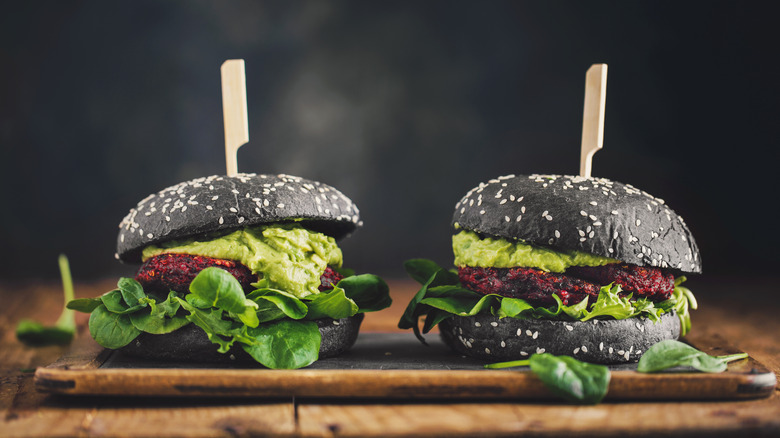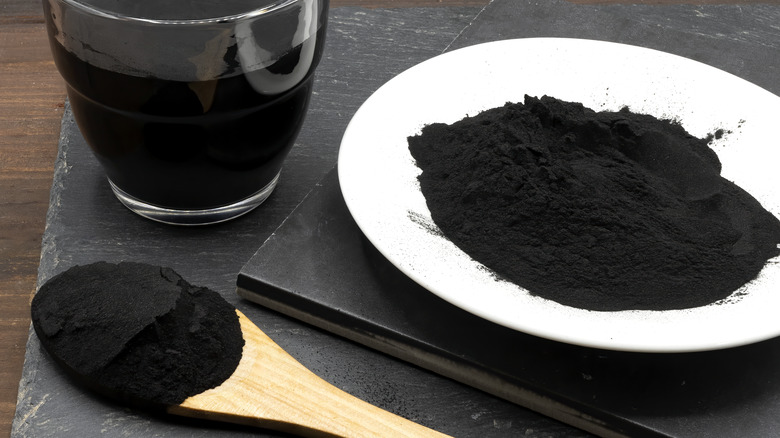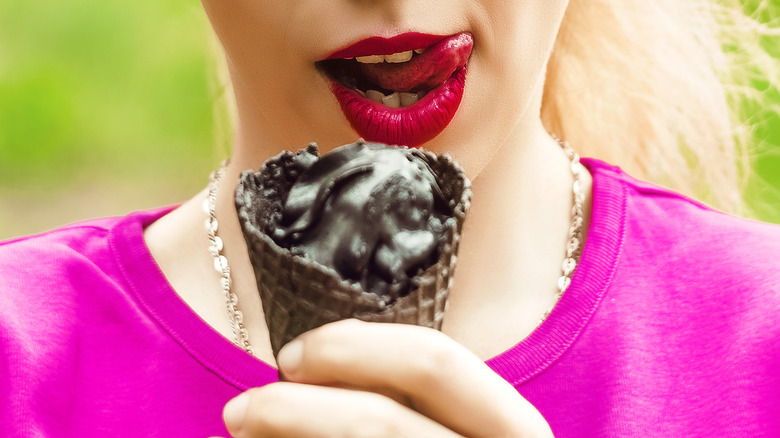Is Activated Charcoal Safe To Eat?
Have you ever tried the popular "Coconut Ash" ice cream? What about black pizza or black burgers? Despite the difference in flavor, these food specialties have one thing in common: they contain activated charcoal, a natural ingredient traditionally used for medicinal purposes.
This substance binds to the chemicals or toxins in the digestive tract and prevents them from being absorbed into your body. As a result, it may help treat drug overdose or poisoning, explains the Cleveland Clinic. Some people also take activated charcoal to relieve gas and bloating or reduce high cholesterol, but there isn't enough evidence to support these uses.
Nowadays, you can order charcoal chai, charcoal "shots," charcoal donuts, and everything in between. Back in 2017, charcoal pizza was considered the latest "goth-food trend" (via Delish). "With its earthy, slightly smoky taste and dark coloring, it gives a premium feel to food and makes it a real talking point," said Michelin-starred chef Jonathan Moore in an interview with The Guardian. But is activated charcoal safe to eat? And does it really have any health benefits?
How activated charcoal works
Activated charcoal powder can treat poisoning with quinine, phenobarbital, and other drugs that can be fatal when ingested in large doses (per Drugs.com). To "activate" the charcoal, manufacturers heat it to high temperatures. The end product is a porous substance that binds to certain chemicals. "The idea is that activated charcoal becomes like a sponge, soaking up things. That's why it's used for toxicology. If you had a medication overdose or drank something poisonous, activated charcoal can bind to it before it can be absorbed by the body. Then, the charcoal just passes through the body," explains Dr. Shripal Bhavsar, a radiation oncologist at Integris Health.
This compound can be ingested or applied to the skin, depending on the intended purpose. For example, charcoal face masks are used to unclog the pores and remove excess sebum, notes Integris Health. Many people also use charcoal toothpaste to get whiter teeth and prevent gum disease. Unfortunately, clinical research doesn't support these uses. Moreover, activated charcoal can cause dehydration and affect the absorption of medications. When used topically, it can dry out the skin, giving it a dull appearance.
Dr. Bhavsar states that activated charcoal cannot "detoxify" your skin or body. While it's true that it may improve digestion to some extent, it doesn't "cleanse" the colon. Plus, it may interfere with your body's ability to absorb vitamins and minerals, leading to nutrient deficiencies. In some cases, it can cause vomiting, indigestion, fecal impaction, or bowel obstruction, warns Drugs.com.
Should you be eating activated charcoal?
Just because something is natural doesn't mean it's safe or effective. Family medicine physician Shilpi Agarwal told Well and Good that food-grade activated charcoal isn't the same as the stuff used in the ER. On top of that, "black" pizza and other foods or beverages contain too little charcoal to make a difference. Dr. Agarwal also points out that charcoal must be consumed within one hour of ingesting alcohol or other toxins to prevent them from being absorbed. "If you spend the weekend eating junk food and take an activated charcoal elixir on Monday to undo the damage, that junk food is likely long gone [from your system]."
Activated charcoal can enhance food flavor and add color, but it's unlikely to boost your health. Plus, it often comes from questionable sources such as petroleum, says holistic physician Gabrielle Francis (via Well and Good). This compound can also make your medications less effective and cause constipation, among other side effects. However, since most chefs only add small amounts of activated charcoal to food, you shouldn't experience any issues. Just make sure you wait at least 30 minutes after your meal before taking medications or supplements.
All in all, it's safe to eat activated charcoal as long you don't go overboard. Note, though, that there's no evidence to support the benefits of using charcoal as a food ingredient. It's unlikely to improve your digestion, prevent a hangover, or flush out toxins.



